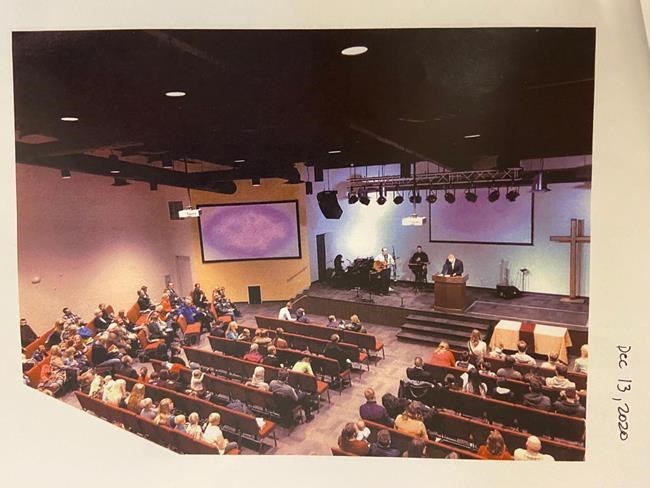EDMONTON — A lawyer for an Alberta pastor accused of violating COVID-19 rules says the province's health agency decided to penalize the church leader as a way to censor him.
James Kitchen told the trial of James Coates that his client was charged the same day he preached a sermon criticizing Alberta's leadership on the pandemic.
Coates was ticketed Dec. 20 under the Public Health Act after health inspectors said he held services at GraceLife Church in Spruce Grove that ignored capacity limits, physical distancing and masking.
Kitchen argued it's not a coincidence that the same day Coates had preached a sermon critical of how Premier Jason Kenney's government was handling the COVID-19 crisis.
"He (had) just preached a sermon that's critical of the government, which is different than the other Sundays that RCMP and (Alberta Health Services) has shown up," Kitchen told the trial in Edmonton on Tuesday.
"The best explanation for why that ticket was issued that particular Sunday after the sermon was preached because it's meant to impose a chilling effect on pastor Coates. It was to send a message ...'You better stop criticizing the government for what they're doing.'"
Provincial court Judge Robert Shaigec said he needs a few weeks to reach a decision and adjourned the case until June 7.
He said he needs to determine whether the pastor's rights were infringed upon and, if so, whether the government's health restrictions are reasonable.
Shaigec heard that health inspectors monitored at least three GraceLife services before Dec. 20 and noted violations of COVID-19 regulations in their reports.
Kitchen told the court that inspectors were also at the church on the morning of Dec. 20, before Coates gave his sermon, but it wasn't until after he was done preaching that RCMP returned to ticket him.
The lawyer called the ticket a form of censorship. He added that health orders meant to curb the spread of COVID-19 violate other charter rights in relation to freedom of expression, assembly and worship.
"We know how important this is to Christians as soon as you look at any history in the Middle Ages or Roman times when the church was born ... gathering in person was fundamental."
By forcing the pastor to remove 85 per cent of his congregants from services, Kitchen added that churchgoers are unable to express themselves the way they would in person.
A Crown prosecutor, whose identity is protected under a publication ban, argued that no one stopped Coates or his congregants from worshipping. She said the church previously livestreamed services when two members tested positive for COVID-19.
"By Mr. Coates being allowed to operate with 15 per cent capacity, he was still able to practise all of those broad protected Charter of Rights. He still was able to practise his religion. He's still able to have multiple services. He's still able to go online," the Crown said.
On the first day of the trial Monday, the health inspector who issued the ticket to Coates testified she observed many "risky" behaviours at the church during four inspections in November and December.
Janine Hanrahan said during one service about 200 congregants were seen cheering, clapping and standing shoulder to shoulder. Typically, the church can fit more than 600 people in its building, but a 15 per cent capacity limit allows 92 inside.
Coates, 41, also testified that the church had 37 Sunday services without any positive cases before health officials closed it and fenced it off in early April.
In February, Coates was also held in custody for violating a bail condition not to hold services. He was released 35 days later, after pleading guilty, and was fined $1,500.
Lawyer Lieghton Grey, who is also representing Coates, said the time the pastor spent in jail was unjust as he lost 10 pounds. He said harassment Coates has faced has also taken a toll on his mental well-being.
"That’s time he can't get back and also the psychological harm is irreparable."
This report by The Canadian Press was first published May 4, 2021.
----
This story was produced with the financial assistance of the Facebook and Canadian Press News Fellowship.
Fakiha Baig, The Canadian Press

